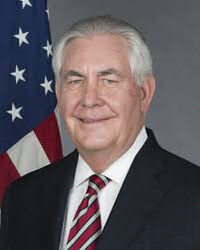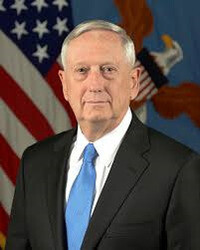hankyoreh
Links to other country sites 다른 나라 사이트 링크
Secretaries Tillerson and Mattis support dialogue with North Korea in WSJ joint contribution
US Secretary of State Rex Tillerson and Secretary of Defense James Mattis clearly reiterated Washington’s willingness to negotiate with North Korea in a joint contribution to the Wall Street Journal that appeared on Aug. 13.

The pair’s publication comes as tensions have eased slightly on the Korean Peninsula after previously rising with US President Donald Trump’s warnings of “fire and fury.” Reports also indicated no plans to expand the joint South Korea-US “Ulchi-Freedom Guardian” military exercises.
In their piece titled, “We’re Holding Pyongyang to Account,” Tillerson and Mattis write that the US “is willing to negotiate with Pyongyang,” while adding that, “ it is incumbent upon the [North Korean] regime to signal its desire to negotiate in good faith.” As examples of signals, they mentioned “the immediate cessation of its provocative threats, nuclear tests, missile launches and other weapons tests.”
Tillerson and Mattis also pledged a non-aggression approach, saying the US “has no interest in regime change or accelerated reunification of Korea” and “do[es] not seek an excuse to garrison U.S. troops north of the Demilitarized Zone.” While this position has been stated numerous times by Tillerson, the message was significant in showing that Mattis, who oversees the responsibility for military mobilization, also supports the view.

The two secretaries also reaffirmed their stance in favor of accelerating diplomatic and economic pressure against North Korea to bring it to the negotiating table. Contrasting it with the Barack Obama administration’s “strategic patience” approach to North Korea policy, the two dubbed it “strategic accountability.” They also hinted at continued pressures on Beijing and Moscow to step up their own sanctions against the North. “[T]he U.S. will continue to request Chinese and Russian commitments not to provide the regime with economic lifelines,” they wrote.
Stating that diplomacy “is our preferred means of changing North Korea’s course of action,” the two stressed that Washington’s bargaining strength was “backed by military options.” As examples of military options, they cited the deployment of a Terminal High Altitude Area Defense (THAAD) antimissile system in South Korea, joint South Korea-US military exercises, and the repelling of any North Korean attack.
Other senior Washington officials similarly joined the effort to mop up after Trump’s inflammatory remarks. “I think we're not closer to war than a week ago,” White House National Security Adviser H. R. McMaster told ABC News, although he added that “we are closer to war than we were a decade ago.”
Central Intelligence Agency (CIA) director Mike Pompeo, who is seen as a hardliner, said in a Fox News interview that he had “heard folks talking about being on the cusp of a nuclear war,” adding that there was “no intelligence that would indicate that we’re in that place today.”
Meanwhile, the Wall Street Journal quoted Pentagon officials as saying there was no plan to expand the “Ulchi-Freedom Guardian” exercises or include a large-scale show of force.
By Yi Yong-in, Washington correspondent
Please direct questions or comments to [english@hani.co.kr]

Editorial・opinion
![[Column] Season 2 of special prosecutor probe may be coming to Korea soon [Column] Season 2 of special prosecutor probe may be coming to Korea soon](https://flexible.img.hani.co.kr/flexible/normal/500/300/imgdb/original/2024/0426/3317141030699447.jpg) [Column] Season 2 of special prosecutor probe may be coming to Korea soon
[Column] Season 2 of special prosecutor probe may be coming to Korea soon![[Column] Park Geun-hye déjà vu in Yoon Suk-yeol [Column] Park Geun-hye déjà vu in Yoon Suk-yeol](https://flexible.img.hani.co.kr/flexible/normal/500/300/imgdb/original/2024/0424/651713945113788.jpg) [Column] Park Geun-hye déjà vu in Yoon Suk-yeol
[Column] Park Geun-hye déjà vu in Yoon Suk-yeol- [Editorial] New weight of N. Korea’s nuclear threats makes dialogue all the more urgent
- [Guest essay] The real reason Korea’s new right wants to dub Rhee a founding father
- [Column] ‘Choson’: Is it time we start referring to N. Korea in its own terms?
- [Editorial] Japan’s rewriting of history with Korea has gone too far
- [Column] The president’s questionable capacity for dialogue
- [Column] Are chaebol firms just pizza pies for families to divvy up as they please?
- [Column] Has Korea, too, crossed the Rubicon on China?
- [Correspondent’s column] In Japan’s alliance with US, echoes of its past alliances with UK
Most viewed articles
- 1[Column] Season 2 of special prosecutor probe may be coming to Korea soon
- 2‘We must say no’: Seoul defense chief on Korean, USFK involvement in hypothetical Taiwan crisis
- 3Division commander ordered troops to enter raging flood waters before Marine died, survivor says
- 4Is N. Korea threatening to test nukes in response to possible new US-led sanctions body?
- 5Is Japan about to snatch control of Line messenger from Korea’s Naver?
- 6No good, very bad game for Korea puts it out of Olympics for first time since 1988
- 7[Editorial] Korea’s surprise Q1 growth requires objective assessment, not blind fanfare
- 8Korea’s 1.3% growth in Q1 signals ‘textbook’ return to growth, says government
- 9N. Korean delegation’s trip to Iran shows how Pyongyang is leveraging ties with Moscow
- 10Amnesty notes ‘erosion’ of freedom of expression in Korea in annual human rights report